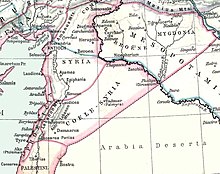Seleucis of Syria (Ancient Greek: Σελευκίς τῆς Συρίας Seleukís tês Surías)[1] was a region of the Seleucid Empire located in northern Syria. It was also known as the Syrian Tetrapolis,
| Seleucis of Syria | |||||||
|---|---|---|---|---|---|---|---|
| Region of Seleucid Empire | |||||||
 | |||||||
| Historical era | Hellenistic era | ||||||
| |||||||
| Today part of | |||||||
on account of its four most important cities, for it had many. These four were, Antioch, Seleuceia in Pieria, Apameia, and Laodiceia (xvi. p. 749). It also comprehended, according to Strabo, four satrapies; and it is clear that he uses the name in a much wider sense than Ptolemy, who places the four cities of the tetrapolis of Strabo's Seleucis in so many separate districts; Antioch in Cassiotis, Apameia in Apamene, Laodiceia in Laodicene, while he only implies, but does not state, that Seleuceia lies in Seleucis."[2]
The four cities had been founded by Seleucus Nicator;[5][6]
- Antioch—named after his father and the largest city.
- Laodiceia—after his mother.
- Apameia—after his wife Apama.
- Seleuceia in Pieria—eponym of Seleucus.[7]

See also
editReferences
edit- ^ Strabo, Geography, 16.2.2
- ^ Dictionary of Greek and Roman Geography (1854), William Smith, LLD, Ed.
- ^ Erickson, Kyle (12 November 2018). The Early Seleukids, their Gods and their Coins. ISBN 9781351811071.Mikhail Ivanovitch Rostovtzev (1926). The Social and economic history of the Roman empire, Volume 2 (Paperback ed.). Biblo-Moser. p. 244. ISBN 0-8196-2164-1.
- ^ Encyclopædia Britannica, 11th ed., s.v. 'Seleucia'.
- ^ Strabo (1889). The geography of Strabo. Bell. p. 161.
p. 161 at Google Books
{{cite book}}: External link in|quote= - ^ "Dictionary of Greek and Roman Geography (1854) William Smith, LLD, Ed". Perseus. Retrieved 5 June 2015.
Dictionary of Greek and Roman Geography, illustrated by numerous engravings on wood. William Smith, LLD. London. Walton and Maberly, Upper Gower Street and Ivy Lane, Paternoster Row; John Murray, Albemarle Street. 1854.
- ^ Society for the Diffusion of Useful Knowledge (Great Britain) (1842). Penny cyclopaedia of the Society for the diffusion of useful knowledge. C. Knight. pp. 476–.
Antient Divisions of Syria. –Under the Macedonian kings Syria was divided into four parts (tetrarchies), which were named after their capitals, Antioch, Seleuceia, Apamea, and Laodicea. (Image of p. 476 at Google Books)
{{cite book}}: External link in|quote=